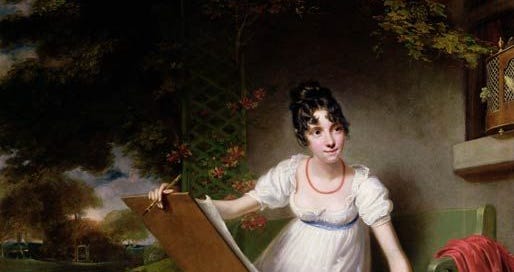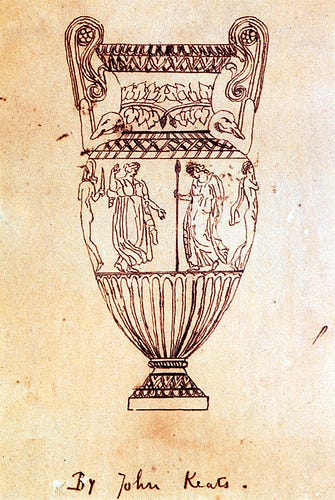Dear Modern Austen: Is what I'm creating good enough?
Modern Austen advises Identity Crisis to find their creative compass.
Dear Modern Austen,
I’m in a mood. The mood is this: Is what I’m creating good enough?
Identity Crisis
Dear Identity Crisis,
Your letter reached me while I was in the midst of thinking about why I write, in spite of how painful it sometimes is to labor at a sentence. I hope my whole reason for writing isn’t based on my 3rd grade teacher’s praise of my ability to fill many ruled notebook pages. At least I’ve since learned that writing well isn’t the same as writing long.—One should be economical with words, keeping readers wanting more. I suppose I write because what else would I do? I identify with writing, which is why I can find it painful; but I also question whether I have the Genius for it. If I don’t have the Genius for writing, then what am I even doing?
It follows that a person who writes can be called a writer, but the identity isn’t so easy to claim when one feels they haven’t written anything. A crisis arises! Is what I’m creating good enough?—Good enough to enter the club of Genius, for I know you’re not really asking whether what you create is good enough to do. The world is full of good enough passing itself off as art. And we buy it, because art is now democratic. Everyone’s an artist, everything is art. We must, therefore, remain our own worst critics. What does this mean? It does not mean settling for “good enough” because you measure Genius by some other artist’s work & know you’ll never reach their level. Virginia Woolf who understood & admired Austen also revered Marcel Proust. Woolf was stimulated by his use of language. “I feel I can write like that, & seize my pen & then I can’t write like that,” she put in a letter to Roger Fry. Who among us hasn’t felt paralyzed by another artist’s Genius? First, their work energizes you, but then you face the blank page or canvas—better known as yourself. “Well—what remains to be written after that?” Woolf writes of Swann’s Way. What indeed! Virginia Woolf did of course write, but she was savage with herself;—if she missed a day writing in her diary, she’d leave the dated page blank to be reminded of her failing. She set standards for her writing & discerned which books were good to read. In failing to become Proust or Austen or any other writer she admired, Virginia Woolf became Virginia Woolf. To be your own critic is to know when you’re not meeting your standards. It’s to know when you’re not using your gifts, as Proust says we must do at the end of In Search of Lost Time.
But surely there is no writer who writes only for themselves? Therefore, Genius must be discerned by others! Forgive me, Identity Crisis, for I’m talking to myself again. Still, I imagine your question is, at least in part, related to whether you’ll find people who appreciate your work. If your work is well-received by an audience, would that make it good enough? This question is at the root of every artist’s doubt. The purpose of your art is to make a lasting impression on the world, yet no writer or painter or sculptor or musician can know they’ve achieved this while they live. The pottery artist who made the Grecian Urn Keats contemplates could not have foreseen that their work would one day be the subject of the most famous Romantic poem; & a young Keats, who did not live past the age of 25, could not have conceived that his Ode would continue to move readers centuries later as the Grecian Urn once moved him. All artists have is the present moment in which they’re either popular, or they’re not. In a letter to her sister from January 1796, written before Jane Austen was Jane Austen, Jane tells Cassandra that she writes for “Fame”:
“I am very much flattered by your commendation of my last letter, for I write only for Fame, & without any view to pecuniary Emolument.”
— Letter to Cassandra from Steventon, Thursday, 14th January, 1796
Jane’s letters are a testament of her wit, but I’m not sure how witty she’s trying to be here. Jane Austen probably did write for Fame, & there’s nothing wrong with that. There’s a school of thought which claims that one should only create art for art’s sake, because Fame is never a certainty. Are we really to believe that our greatest artists never practiced their craft with Fame in mind? That they put their work out in the world without a desire to be known by it? Jane Austen did write for Fame, but she was clear on what she would do to achieve it & who she wrote for.
Austen didn’t just write books—she gave birth to heroines, & her aim was to break with the tradition of romance novels at the time & make them imperfect. In letters to her niece Fanny Knight, Austen writes of her distaste for heroines who are “pictures of perfection as you know make me sick & wicked”; that “Miss Catherine [Northanger Abbey] is put upon the shelve for the present, & I do not know that she will ever come out”; & how Anne Elliot “is almost too good for me.” She cared for all her heroines & had to suffer the anxiety of not knowing whether readers would like them. “I must confess that I think [Elizabeth Bennet] as delightful a creature as ever appeared in print,” she writes Cassandra in 1813 after P&P was first published. “How I shall be able to tolerate those who do not like her at least, I do not know.” Say what you want about the writing, about any perceived errors, but do not bash my Lizzy! Austen demands careful attention from her readers by challenging them to like an unlikeable heroine (Emma Woodhouse) or question how happy the safe, comfortable endings she gives her heroines really are; she never gives anything away freely to her readers. In doing so, Austen has defined who she writes for: “I do not write for such dull Elves.”
As an artist, it has to be enough that you’ve found your readers, that you’ve been understood. So often popularity comes from misunderstanding an artist’s work. One reason Jane Austen has stood the test to time is that people misread her, focusing on the romance as opposed to the societal questions she raises in each of her novels. Perhaps this didn’t matter to Austen as long as she had readers who understood her work. To create is to let go. Once S&S & P&P & Mansfield Park & Emma & Persuasion & Northanger Abbey were published, their heroines no longer belonged to Jane. In her time, she did hear from admirers. Austen wrote to the Countess Morley in 1815 to thank her for her early praise of Emma:
“In my present state of doubt as to her reception in the world, it is particularly gratifying to receive so early an assurance of your ladyship’s approbation.”
All the assurance Austen needed was that her readers hadn’t tired of her yet. That was the line she drew for her & her audience. “I have not yet—as almost every writer of Fancy does sooner or later—overwritten myself,” she ends her letter of thanks to the Countess of Morley.
I sense an ultimatum in your letter, Identity Crisis;—if what you’re creating isn’t good enough then…what? Should you give up? I’ll ask you this: Could you stop creating even if you wanted to? Your answer should put this question of giving up to rest. Even if it seems like no one has any interest in your work, you can’t know who it will one day speak to. Unlike surgeons, artists have no way to calculate how many lives they’ve saved. Right now without your knowledge, your art could have reached someone in some far corner of the globe. Your work might have shown someone the light in the dark, the truth in beauty. Your art might have confirmed for someone that life is worth living. You’ll never know, but what does that matter? Even if you manage to make money from your art, that’s no indication that you’ve touched someone’s soul.—People buy art for many reasons, & they rarely have anything to do with finding communion with a work. Yes, keep creating! You can’t know what tomorrow or forever holds for your art. Most Genius is only discovered after a creator is gone. Your Genius won’t be discovered at all if you stop now.
You can’t control how or when or why your work will be appreciated. All you can do is figure out who you are as a creator & make that your compass. The criticism Austen received took the form of “why don’t you write a romance that will bring you more money & popularity?,” to which she replied, “I could no more write a romance than an Epic poem.—I could not sit seriously down to write a serious Romance under any other motive than to save my life.” She could have allowed herself to be guided by this opinion rather than her compass, which would have been a disservice to her readers & her work, but she never did write a romance. “I must keep to my own style & go on in my own way,” she writes in her letter to James Stanier Clarke—an author, biographer, & Naval Chaplain who often tried to get Jane to accept his ideas—in April 1816. “And though I may never succeed again in that, I am convinced I should totally fail in any other.” Jane Austen could not have known how many years beyond her lifetime her Fame would extend. Whether we modern readers are ones she would have wanted, well, that’s art for you.
Yours,
Modern Austen <3
If there’s a personal matter you’d like Modern Austen’s advice on, you can send your letters to modernaustenblog@gmail.com. Please indicate whether you’re comfortable with your letter being published, & do use a clever pseudonym.





